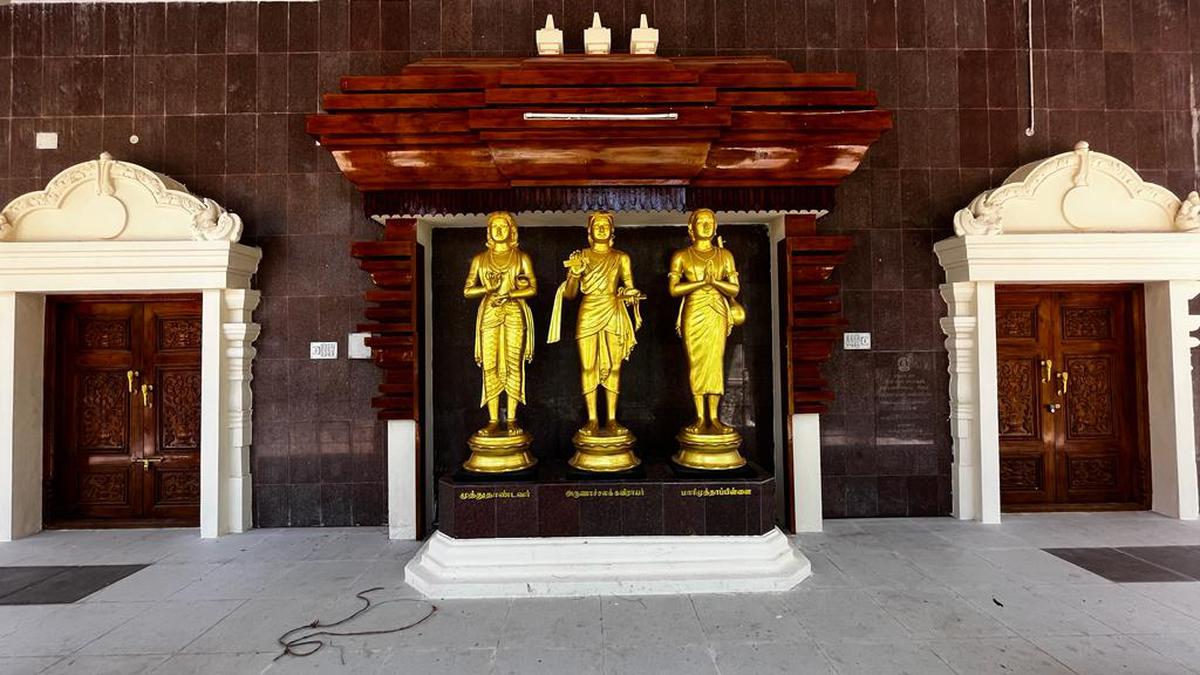
Tamilisai Moovar of Sirkazhi: the pioneering trinity of Tamil kritis
The Hindu
Explore the contributions of Tamilisai Moovar to Carnatic music & Tamil culture in Sirkazhi, Mayiladuthurai district, Tamil Nadu.
Music and the Tamil landscape have been inseparable, right from the Sangam Era. Several legendary figures have contributed to the evolution of music down the ages and played a crucial role in intertwining art and culture with the social milieu.
Three such personalities were the Tamilisai Moovar (Tamil Trinity) — Muthuthandavar, Marimutha Pillai, and Arunachala Kavirayar — who composed conventional kritis in Tamil and made invaluable contributions to the evolution of Carnatic music. All three lived in Sirkazhi in present-day Mayiladuthurai district and composed numerous kritis much before saint Tyagaraja and others.
Though there is no authentic information on the exact period during which Muthuthandavar lived, the Tamil Virtual Academy of the State government, which offers various academic courses online and is involved in digital documentation of rare printed books, periodicals, manuscripts, photographs, and audio-visual materials of Tamil literature and culture, indicates his period could roughly date back to the 16th Century. Arunachala Kavirayar (1711-1779) and Marimutha Pillai (1712-1787), who lived two centuries later, continued composing kritis in Tamil.
Elaborating on the contribution of the Tamilisai Moovar to Carnatic music, Rama Kausalya, former Principal of Tamil Nadu Government Music College at Thiruvaiyaru, says it was Arunachala Kavirayar, who first set the stage for operas (musical dramas) in Tamil through his Rama Natakam.
Kavirayar was born to Nallathambi Pillai and Valliammai at Thillaiyadi, near Thirukadaiyur. He moved to Sirkazhi and was patronised by the Dharmapuram Adheenam. He taught Tamil to Kothandaraman and Venkataraman, his disciples, who later assisted Kavirayar in composing music for Rama Natakam.
Kavirayar composed 258 kritis by simplifying the verses of Kamba Ramayanam and became the first to compose musical drama in Tamil. “His songs are widely sung by musicians in concerts, even now, and provide a sense of comfort for contemporary performing artists to exhibit nuances of the Ramayana plot,” Dr. Kausalya said. Kavirayar’s Rama Natakam, similar to Kamba Ramayanam, was also staged at Sri Ranganathaswamy temple in Srirangam. His Rama Natakam was also called Sangeetha Ramayanam. His other contributions include Asomuki Natakam, Sirkazhi Sthala Puranam, and Sirkazhi Kovai.
Marimutha Pillai was born in Thillaividangan village near Sirkazhi. He was a pioneer in composing Ninda Stuti Kritis, in which the divine was praised through questioning and criticism with love. On a pilgrimage, he visited many temples and composed nearly 25 kritis in 17 ragas, references in Tamil Virtual Academy say. His contributions include Puliyur Venba and numerous Padhigams and Kuravanji.











